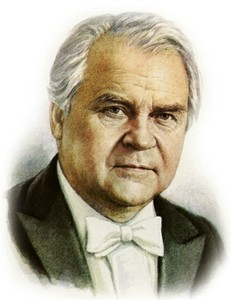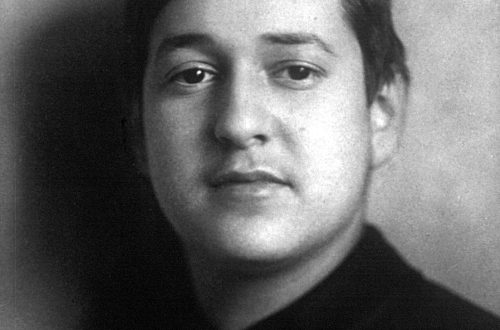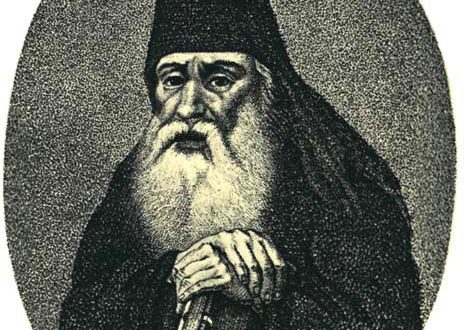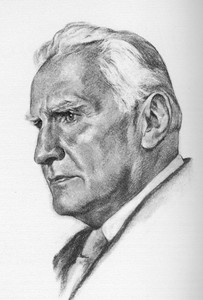
Tikhon Khrennikov |
Tikhon Khrennikov

“What am I writing about? About the love of life. I love life in all its manifestations and highly appreciate the life-affirming principle in people.” In these words – the main quality of the personality of the remarkable Soviet composer, pianist, major public figure.
Music has always been my dream. The realization of this dream began in childhood, when the future composer lived with his parents and numerous brothers and sisters (he was the last, tenth child in the family) in Yelets. True, music classes at that time were of a rather random nature. Serious professional studies began in Moscow, in 1929 at the Music College. Gnesins with M. Gnesin and G. Litinsky and then continued at the Moscow Conservatory in the composition class of V. Shebalin (1932-36) and in the piano class of G. Neuhaus. While still a student, Khrennikov created his First Piano Concerto (1933) and First Symphony (1935), which immediately won the unanimous recognition of both listeners and professional musicians. “Woe, joy, suffering and happiness” – this is how the composer himself defined the idea of the First Symphony, and this life-affirming beginning became the main feature of his music, which always preserves the youthful feeling of the full-bloodedness of being. The vivid theatricality of musical images inherent in this symphony was another characteristic feature of the composer’s style, which determined in the future a constant interest in musical stage genres. (In the biography of Khrennikov there is even … an acting performance! In the film directed by Y. Raizman “The Train Goes to the East” (1947), he played the role of a Sailor.) Khrennikov’s debut as a theater composer took place at the Moscow Theater for Children, directed by N. Sats (play ” Mick, 1934), but real success came when at the Theater. E. Vakhtangov staged a comedy by V. Shakespeare “Much Ado About Nothing” (1936) with music by Khrennikov.
It was in this work that the composer’s generous melodic gift, which is the main secret of his music, was first fully revealed. The songs performed here immediately became unusually popular. And in subsequent works for the theater and cinema, new songs invariably appeared, which immediately went into everyday life and still have not lost their charm. “Song of Moscow”, “Like a nightingale about a rose”, “Boat”, “Lullaby of Svetlana”, “What is so disturbed by the heart”, “March of the artillerymen” – these and many other songs of Khrennikov began their lives in performances and films.
Song became the basis of the composer’s musical style, and theatricality largely determined the principles of musical development. The musical themes-images in his works are easily transformed, freely obey the laws of various genres – be it opera, ballet, symphony, concert. This ability to all sorts of metamorphoses explains such a characteristic feature of Khrennikov’s work as the repeated return to the same plot and, accordingly, music in various genre versions. For example, based on the music for the play “Much Ado About Nothing”, the comic opera “Much Ado About … Hearts” (1972) and the ballet “Love for Love” (1982) are created; the music for the play “A long time ago” (1942) appears in the film “The Hussar’s Ballad” (1962) and in the ballet of the same name (1979); the music for the film The Duenna (1978) is used in the opera-musical Dorothea (1983).
One of the genres closest to Khrennikov is the musical comedy. This is natural, because the composer loves a joke, humor, easily and naturally joins in comedy situations, improvises them witty, as if inviting everyone to share the joy of fun and accept the conditions of the game. However, at the same time, he often turns to topics that are far from only comedy. So. the libretto of the operetta One Hundred Devils and One Girl (1963) is based on materials from the life of fanatical religious sectarians. The idea of the opera The Golden Calf (based on the novel of the same name by I. Ilf and E. Petrov) echoes the serious problems of our time; its premiere took place in 1985.
Even while studying at the conservatory, Khrennikov had the idea to write an opera on a revolutionary theme. He carried it out later, creating a kind of stage trilogy: the opera Into the Storm (1939) based on the plot of N. Virta’s novel. “Loneliness” about the events of the revolution, “Mother” according to M. Gorky (1957), the musical chronicle “White Night” (1967), where Russian life on the eve of the Great October Socialist Revolution is shown in a complex interweaving of events.
Along with musical stage genres, instrumental music occupies an important place in Khrennikov’s work. He is the author of three symphonies (1935, 1942, 1974), three piano (1933, 1972, 1983), two violin (1959, 1975), two cello (1964, 1986) concertos. The genre of the concerto especially attracts the composer and appears to him in its original classical purpose – as an exciting celebratory competition between the soloist and the orchestra, close to the theatrical action so beloved by Khrennikov. The democratic orientation inherent in the genre coincides with the artistic intentions of the author, who always strives to communicate with people in the most diverse forms. One of these forms is concert pianistic activity, which began on June 21, 1933 in the Great Hall of the Moscow Conservatory and has been going on for more than half a century. In his youth, as a student at the conservatory, Khrennikov wrote in one of his letters: “Now they have paid attention to raising the cultural level … I really want to do … great social work in this direction.”
The words turned out to be prophetic. In 1948, Khrennikov was elected General, since 1957 – First Secretary of the Board of the Union of Composers of the USSR.
Along with his enormous social activities, Khrennikov taught for many years at the Moscow Conservatory (since 1961). It seems that this musician lives in some special sense of time, endlessly expanding its boundaries and filling it with a huge number of things that are difficult to imagine on the scale of one person’s life.
O. Averyanova





